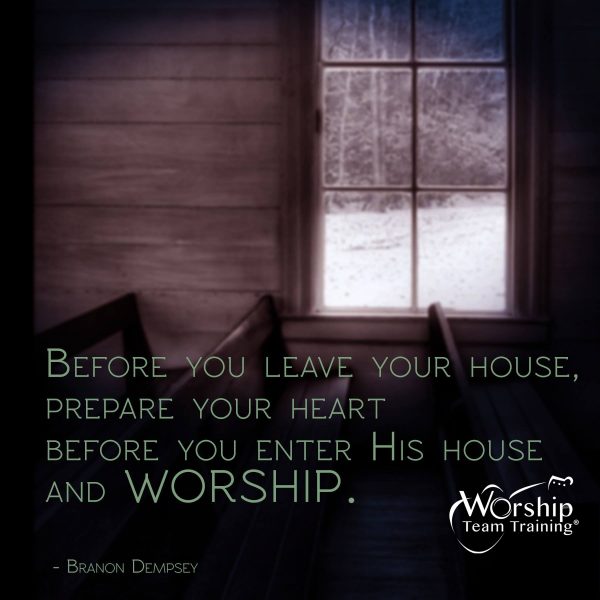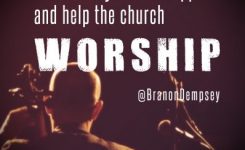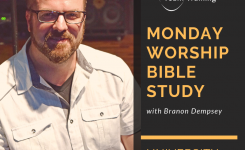Podcasts / Devotionals, Worship Theology
Why Do We Hold Back In Worship? (Show #71)
 #CallUponTheLord (Video Below)
#CallUponTheLord (Video Below)
4 min read
Know when to hold ’em
Why do we hold back in worship? When I was a young growing up in the church, I did what the other church-goers did: folded my hands and silently prayed before God. As reverent as this may sound, it was also so reserved. There was no sight of a lifted hand or a sound of a raised voice.The services were so quiet, that you wondered if God was truly there, or if we were just worshiping in the shadows. This had a major impact on the way I viewed God. What seemed like a weekly discipline, also served as a template for going to church. But then I wondered, if we as humans experience real emotions like pain, despair, joy and laughter, wouldn’t the God who made us feel these things too? And if so, why couldn’t we talk to Him, hear from Him and express these same things?
At times I felt like I was being taught to walk the fine line at church. Older adults would tell me not to disturb God with our feelings. This also made me more self aware and often timid in daily life, that I would not upset God.
God holds nothing back in His love for us, neither should we.
How often do others think the same?
Not wanting to go to God with their true feelings or utter prayers with full emotions. Maybe they feel barred by God, as if he was a police about to give them a ticket. Maybe they feel God is a supreme judge about to sentence them to a life of confinement.Sad to say, but this happens more often that what we think. Also, this impeeds on our church’s ability to fully worship by similar and other reasons. How our God must long to hear His children sing. How he must deeply desire to hear His people call upon Him. Don’t we read these truths in Scripture?
“Call Upon The Lord,” Feature Track of the Week
This week is our new theme #CallUponTheLord; we will look more closely at what it means to call on God in life and in worship. We will also examine what it means to call on God as a means for leading worship.“Call Upon The Lord” Words & Music by: Steven Furtick and Chris Brown. Permission by Capitol Records. Get the music on GuideTracks.co
Verse 1 – We need no other hiding place Our hope is safe within Your name This we know this we know You promised never to forsake What You began You will sustain This we know this we know
Chorus 1 – I will call upon the Lord For He alone is strong enough to save Rise Your shackles are no more For Jesus Christ has broken every chain
Verse 2 – All of the heavens and the earth Announce the fullness of Your worth This we know this we know And every enemy will flee As we declare Your victory This we know this we know
Bridge – Jesus’ name will break every stronghold Freedom is ours when we call His name Jesus’ name above every other All hail the power of Jesus’ name
“A broken spirit is complete praise to God.” @BranonDempsey
What does the Bible say?
Do you feel to broken too praise, or too broken for God to hear you? Let’s look into what the Psalms have to say about calling on the Lord. Let’s look at how the Bible doesn’t hold back. In fact, we see true emotion, struggle and joy pour out onto the Father’s feet to render worship. Psalm 40
1 I waited patiently for the Lord; he turned to me and heard my cry.
2 He lifted me out of the slimy pit, out of the mud and mire; he set my feet on a rock and gave me a firm place to stand.
3 He put a new song in my mouth, a hymn of praise to our God. Many will see and fear the Lord and put their trust in him.
Does God accept me, even if I’m broken?
David understood the place of brokenness in worship, for he wrote, “the sacrifices of God are a broken spirit: a broken and a contrite heart, O God, thou wilt not despise” (Psalm 51:17). In referring to a broken spirit, David uses the Hebrew word shabor which means to shiver, to break to pieces, or to reduce. A spirit that trembles in God’s presence, or has been broken into multiple pieces, is classified as an acceptable sacrifice in worshipping God. Yes, God accepts you, your praise, heart and life, despite that you are broken. He broke Jesus on the cross as the perfect sacrifice so that we may be pleasing to the Father. God loves your brokenness because He loves and accepts you just as you are.
When David spoke of “a broken heart,” however, he used an entirely different Hebrew word, dakah, which means to crumble, to beat to pieces, to bruise, to crush, or to humble. To this he adds the expression “a contrite heart.” “Contrite” is a word that is used to describe the process of making talcum powder.
In days gone by some brands of talcum came in containers on which were printed the words, “this is stone that has been contrited.” It simply means that what was once part of a mountain has been ground and pounded so fine that it will float on water. It now has taken an entirely different form. Did the prophet have this in mind when he wrote, “Is not my word … like a hammer that breaketh the rock in pieces?” (Jeremiah 23:29). We can receive His love because He does recieve our brokenness.
In fact, our brokeness is the opporutnity of worship, to call upon the Lord and to have Him come and heal every part. Worship requires being broken, as He breaks every chain, for He is strong to save!
COMING UP TODAY / WATCH SHOW #71!
Copyright 2016 Worship Team Training®









